By Pamela N. Danziger
Across the globe, affluent consumers whose numbers and wealth are growing at a phenomenal pace are experiencing an uneasy sense of déjà vu.
“It’s feeling a lot like 2007,” said Cara David, managing partner at research firm YouGov, reporting the results of its Affluent Perspective Global Study among nearly 6,000 of the top 10 percent consumers around the world.
In the 13 markets surveyed, and most especially in the United States, which represented the largest affluent consumer sample surveyed and which also is the world’s largest market for luxury, enthusiasm to spend more on luxury is waning.
Drop top
The share of affluents who say they expect to spend more on luxury has dropped sharply, from 40 percent in 2016 to 31 percent in 2018 – a statistically-significant 9 percentage point decline.
The pullback on spending most especially is felt by affluents in the most developed luxury economies, notably Australia, Hong Kong, Germany, Japan and the U.S.
By contrast, affluents in the Middle East and Asia are level in their expectation of more luxury spending. But they cannot make up for the shortfall in declines in the developed markets, with an expected slide of negative 3 percent in expectations for greater luxury spending in the next year. And the downward trend is even more pronounced in North America where the net decline reaches -7 percent overall.
Commenting on the results, Chandler Mount, vice president of affluent perspective at YouGov, said, “There are two forces going on. While there is a growing wealth class, at the same time there is an emotional pullback. They don’t feel as confident as they could or they did in the past.”
This does not necessarily mean doom and gloom for luxury brands, since there are more people in the wealth class that can afford to indulge in luxury. The growing numbers of affluents can make up for reduced spending at the personal level, but he cautions, “We might see an increase in the luxury market, but it is going to be harder to get.”
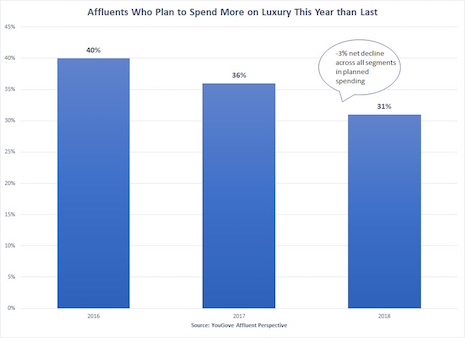 Affluents who plan to spend more on luxury this year than last. Source: YouGov
Affluents who plan to spend more on luxury this year than last. Source: YouGov
Luxury brands do not see this coming
These results forecasting reserved consumer spending on luxury stands in stark contrast to the luxury industry’s perspective for a bang-up year in luxury in 2018.
In Unity Marketing and Luxury Daily’s State of Luxury study conducted among a sample of 599 luxury industry insiders, nearly half of all luxury industry executive surveyed expect business conditions to improve in the luxury market in 2018.
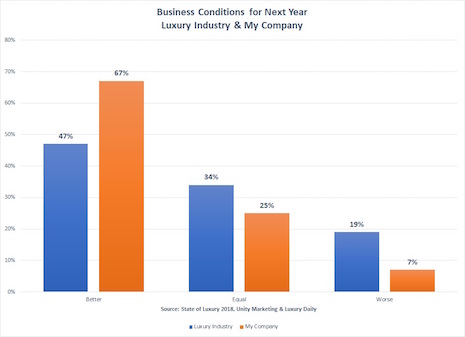 State of Luxury 2018 Business conditions luxury industry. Source: State of Luxury 2018 report by Luxury Daily and Unity Marketing
State of Luxury 2018 Business conditions luxury industry. Source: State of Luxury 2018 report by Luxury Daily and Unity Marketing
Regarding prospects for their own company, luxury insiders are even more optimistic for their companies in 2018. More than two-thirds feel their businesses will do better next year.
In this, the luxury industry insiders surveyed mirror the positive expectations for the industry predicted by Bain & Co.
Bain expects overall growth of 5 percent for the global personal luxury goods market, after what it calls a “reboot” from 2015-2016. Through 2010 Bain sees the luxury market reaching a “new normal” of 4 percent to 5 percent annual growth through 2020.
The YouGov survey, however, challenges these positive expectations.
Dark clouds on the horizon
The chief factor putting the brakes on luxury consumer spending is their lack of confidence in the world’s and the nation’s economy. This is from where the sense of déjà vu is coming.
“This well-informed, educated group was impacted one way or another by the Great Recession,” Ms. David said. “We believe this pullback in spending is a result of a variety of reasons, primarily their concern for the U.S. economic future.”
While the world’s affluent consumers are less confident in the world’s economy, they are more so about their own personal economy, with 44 percent feeling extremely or very confident in their own finances.
But this too is taking a dive in Japan, Hong Kong, France, Singapore and the U.K., most especially.
Affluents in China are the outliers, feeling the most confident in the world’s, their country’s and their personal economies.
Interestingly, if lack of confidence in the greater macroeconomic factors that consumers have virtually no control over is pulling their expectations for future spending down, these are the same factors that luxury industry insiders also saw as potentially disrupting their prospects in 2018.
However, the luxury insiders believed that their companies should be able to overcome the negative effects from political turmoil, monetary policies and broader economic trends that could derail their growth in 2018.
Given the results of YouGov’s latest survey, the luxury insiders may have a sense of false confidence.
Troubled times, emerging opportunities
On a global basis, luxury automobiles may take the biggest hit, with a net -10 percent expectation in spending, with Mr. Mount saying that 2017 may have been the category’s peak year.
Luxury cruises are also expected to see reduced spending, off 8 percent.
Luxury jewelry/watches, fashion, and hotels will feel consumers’ tightened wallets, but only in the -3 percent range.
By contrast prestige facial skincare and beauty should hold its own.
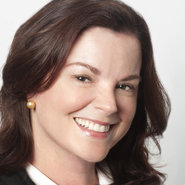 Cara S. David
Cara S. David
For the U.S. market, Ms. David predicts a pullback in most every category, with jewelry/watches and fashion impacted the most.
“This disciplined approach in spending, combined with other factors disrupting the luxury sector, will make for a very competitive marketplace,” she warns.
However, two bright spots are emerging in the luxury market: luxury hotels and entry-level luxury.
Affluents express a clear-cut preference for experiencing luxury as opposed to owning luxury. And the primary luxury experience they are looking for is a luxury vacation, with 66 percent of those surveyed saying they would take a “luxury vacation over luxury products any day.”
In terms of their brand choice in experiences, Mr. Mount points to innovation as a key brand value.
“The role of technology as a predictor of satisfaction in brand choice is increasing,” he said.
What that means for luxury hotels is a growth opportunity for those that innovate by bringing technology enhancements into their hotel properties and rooms.
Affluent travelers expect automated check-in, digital keys, digital payment on the property through mobile applications and full-service functionality throughout. They also are keen to have login access to personal entertainment streaming services from the room television, Bluetooth integration in the room sound system and screencast from their personal devices.
And in the future they are looking for an in-room digital assistant and biometric reads in check-in, digital key and payment systems.
Opportunities in entry-level luxury can be found thanks to the rapidly growing numbers of millionaires new to the luxury lifestyle.
“Some 11.5 million have been added to the millionaire class globally,” Mr. Mount said. “So entry-level luxury is poised to grow.”
But those brands that want to tap the potential of the new-wealth consumers need to be mindful of what they are looking for in brands they choose to do business with, and it is not what it used to be.
It is no longer enough to offer good quality and craftsmanship. Luxury brands need to be good and do good, not just make good products.
Changes in latitude, changes in attitude
In tracing the trajectory of consumers’ attitudes toward luxury indulgence since 2002, the YouGov study identifies four key pivot points.
In 2002, luxury consumers had an overpowering conspicuous- consumption drive that came to an abrupt end with the recession.
“In 2007, it hit them like a ton of bricks,” Mr. Mount said. “They bought too many houses, too much stuff to put in them, and too many cars. Resourcefulness, simplification and comparison shopping became the name of the game.”
Then in 2012 as the economy got stronger and consumers felt more confident in their jobs, luxury consumers’ mood turned from saving money toward getting the most value out of the purchases they made.
“The search was on for how to spend money for the best stuff,” Mr. Mount said. “It became a drive for quality, craftsmanship and service provided by a brand to justify the price that they would spend.
“It didn’t return to a question of, 'How do I buy more houses and fill them with more stuff?', but 'How do I buy the best stuff I possibly can?'" he said.
In 2018, this mindset has continued to evolve beyond just a search for quality, craftsmanship and service to looking for purchases that give more meaning.
“They are looking for brands that serve a higher purpose, that reinforce and mirror their personal values,” Mr. Mount said.
Search for deeper meaning
They call it a trend toward “goodness-based spending.”
Overall, four out of 10 affluent decision-makers see that luxury brands have very similar quality and craftsmanship. What they want now is brands that express values in line with their personal values.
“It is a search for deeper meaning,” Ms. David said.
The values that affluents hold most dear in the brands that they align with are honesty, being relatable, committed to do the right thing, that share their personal values and follow sustainable practices.
A decisive 71 percent of luxury consumers surveyed said, “I am looking to connect with brands that make a positive impact on the world.”
“Luxury consumers are searching for stability and security in a world where things are unstable and security is questioned,” Ms. David said. “They value inner peace for a number of reasons, one of which is finding their place on the right side of an unbalanced world.”
Luxury consumers are looking for brands with a higher purpose. They want their purchases to help them attain their ultimate personal goals, which in the survey include being healthier, spending more time with family, going to new places and doing new things, learning something new, to be a better person and simplify their life.
FOR THE AFFLUENTS, their relationship with brands has become very personal. They are seeking to align with brands that are a mirror of themselves and their personal values.
Exceptional quality, craftsmanship and service are simply table stakes for these consumers.
“They are looking for brand perfection, to be flawless,” Ms. David said. “Their high standards have to be luxury brands’ high standards.”
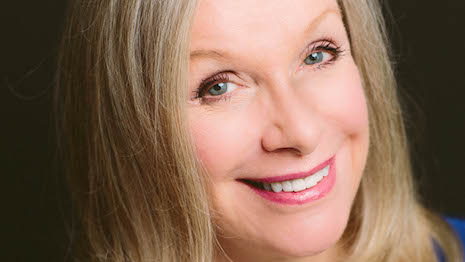 Pam Danziger is president of Unity Marketing
Pam Danziger is president of Unity Marketing
Pamela N. Danziger is Stevens, PA-based president of Unity Marketing and Retail Rescue, and a luxury marketing expert. Reach her at [email protected].
{"ct":"TFrgP0EGap03k5XKFxOGrFtEs30EIfjaWNjsguLpaD9jOSesrjA8XWnnIMPztVeVx\/xbHo2fNNLuItrwQD333QqbmbvlYOZohr\/EA\/nEXRuQckUKt86ZnW0y1VSdDARJe4mc361AH0M5DNKVbarLZfMqgiiy2dvHzZHLlkwiPHJ5kd9eh6\/Z2kGCQvMBC3JKXjzQ5l\/xMUnid2pjz7srvYjk0\/ovrGqSpeR4CLSWXmve+kzmvbxgyI9QDZdsMX0nrg8dtcrd+WogEVvLqqIYH4XRfpE7m64AMNCTEBYgZ5mRz1oIa910HkbWrROW\/Df2OmuLVE4AGRu1wSXfw4qkXBrTbhAsk111To\/\/z+2KYvIx3wADckJDc9bJHIWfPp78OXTTcq6Cbes1RI\/qu1xXMYb+ioS4TMqJB7Y4id2DbcQV7KMUpj9h4HrmBkPaESun21Kh6Eg2wrWtz6aR3tzJ4Hz+3hnBa\/PIVTqXl2Jgb1XtLzmofDDkkmsjrYYimnan++E+sNJNuub28NSkRGnE\/gO0Zrm\/xX1YMz24qKnjpdCLF7m75y2jniAbK8fhJbe1g0UZLG07RwbgF1YbJjXKUFjbHjmBOlHGi0VA0X3vgHQyZEdSiwShjHFW6vCrUuktxAILvq3q\/Wrk41WBfoRS2BKBKtu0\/18vnYRL6T4+Bg\/H4xNzdz\/baojAdGIC1xzMjqJeZHxim0LkAVLg1liiDTK9IIHY2tGD5uXlV9K140EBaW+JdZjTjMz7ee2Ov2AjcGRFC22+g48Xe8CAHzD2cDe0hedOcflGEl6P3xQvxYCjoGHe6udq12zv\/4yHfP8SBJeEqtCSraMhC14j9TOnBq0WMbZKHCJ0uZwN+zRjVIkLzJHemU611eiIzuWURGP4ruddkBIoZNV7OHfQRac8HkxZK8AUqmNUbWH58AhPUQQeluPXngJBGikWakcrZpRDKquWtBEOhkpO2OQaj82aZVRMwjLdnA2hPYLmkWA48aBk7HDZqhUWVQd+zPqZ3BMOIoRhnOmZfkc4z1PH1HBcv1yknpFmMxqp0sDZ\/cJLyqnPJPADQIMsCzKAW5fhGLjW4ef3+N5ElI4JJdIAVDWHfbPu7YwEgOSxC+0MYtYFPe39skrw3qEJCVMfbrZ+m3TSgAsSnuWyYuBMGOhIaBSj1P08fNSpLbMUDHTNolwO+5f5v4BzUkHAxJscLT6mb+TlG+2MdBPvndwUCVH7HWU6WOXRptgt3jDWVJf5thdCn2BHInxRf3YsjNaBsun+ee9YvXCY14sL6yBXT5h756Ny0mtI9uOIKevbqQ53NOTSCwIRkro3JnqBw+pDQCbvxcfNjFW7qRdat6TfUESWib1bTke+vsbLW7ofEhdp35C\/EPf7uDNVd+JqXX6Hmk9Wl5eR6R43WlNaTdrXpfpGDO2OwAoPRc7GWEYlnxx\/p+2o47mU890DoQwP5FNmwMgRhl4DWGtd8Lc8dudnDMdHzwo5UUM25dbVygIsz2FuroKtk4Tge72A8coWOfPpG0OzZZnpHpyYDNXP2r6TDMz8LcufL9P0u\/TuNyaW0jjt08J0sJxNC+DsizUdvwLkMMBP5jLkanzZh6yMnpyb58dOWO5to73LRxGWqMKETPwx9LlOVs7buDiHRVB1V6DR+ZWW\/FG5IfxX\/syXhjN+3NbdRw2PmZqkX9ykwIBMqNzF054GwwJO53r5hCQ\/wSscq2DlCukJzr+SPzBBGBNZ2OFfIFfLCVopCRP2gDBMHrySYMLsHJ\/42oRgNR05ZV0S4+yR4GrwhT9BEMBFRJ90Sf\/qqaVxM7F2eAIKek41vxN5di5DGBgcD6tvcsOP7FPUFReU2E\/Jhf\/ZYF7ajXSKKLSw8tBG1ZZtRP6324C6PMiDK1tvRZtkXmCQ\/DfJu46rQUso6ZAFhzBckbeyn1ITy03LZdFivXWSeEEJvOAh3O08GpxdyHuxLYiaRytMzFqUyaVIZcxwve3L+rg8sTJm2Z4bijk9LuJtphRhAJY+GXgphZbnw3dOQcGmZcvPa2Y89JdLpchGn2\/xEhkNurryPiyga34UXEUHWiZ8Qdfap9UxNAaTng22t9ECpuptFzByfODdpNNOVNmeliwggyF82J1+H\/bw7+Rr27\/xCPyoFi4TQkPhsutmo6X0mbgKp4TFWmSgHPR3N3HuDOjgwHJS7MSCUKErTg+Xkm4p9Ph5kirYjTrQO4SJm\/b+Jb45i0xIMImBWwVww9zjnPG6Zfdjl4gKq5u5Z6OMyY1RYDHMaQa2DF6SJeZISc+BgR\/KJauQqVG2jOAe1HzD05ERtxrOn\/4qHNCcpTbS1UNDLOnF5kbq1dRW9Pd5+zu0PBfzgomHmgvmxJtX6fR0v7ySGW\/LjYsYUxn\/L\/wVGKuupXXStq8hlW\/tmLNLWusXG2SZzTnONUVhI1Ur6d6TiuN\/VpsGX\/PLMl8Tin034dinY+bEmjt4Lhe6kQEL6V4x5kPFpXFPHjeRl3e\/h6qw9HahyX++cCaFnV+3orurRQxmcY5KPp6sbv0snHet6pnE4j\/8Ju6cA1FtAnmlE\/VkQnEtBLeYJ8HfGZO9MLiqIFlapAX6yEn2I\/UxvD49KJkqohUxLz\/wPANUaLlzxTj6+Emh8d9TgQVXh6iIHE+fIfutqybLpPQyUH9x61Wy8JDs+y7P5cGmNuVV4XYL4wOhbM+IqE35BSp2TicZb2mq2w3QsYjuDrt9B+OYsLoYHMC19JKL2Xjr1zuTV3ivTHN1vgvr5RbLpzQaCM9M51wPpNGqa6xK5Jpcqo6ziuefX1av4wHfDd60IKbwloZ8ge3tJQsNK9MXWGT8C9ioS6ipC\/15gHalanidz902mfswAQCpLyPS+Lzh6h5keQuQN0PL278vCx4nUmQdLEXFKfj4fcg4swtJsE1WJl40\/nI\/kXH\/DRTLSoNex83TYbEdfYPKZ\/+jD5DkG\/nhiRW6rbqijUSS5QkCH4D4+b6hammcdj9wbsVt+Yz2K77pnx\/k0qLz0XkmX51PBRiTtHVqvl9Wc46ExcDWf6k+VtV9zcVy9\/qihdNYmfUQxPW9WsI+YQK3KaxbiiN5Tq8nUL25r8RtBN4imJFHUYHRafnCR9MNF2lYsuwKGgJyRdb3U9IFlpuKJVoWDCscfQFw7cg+Rrge1KaycLZHZ\/nKOouFrAACZikcyWSnCmFvdvLH6SDZdGVaBIMI21rb9pwAiRiqp9wMql2TxKiRQG0LJQkJPQlllomD3TaLY9tpT01BOCem4BAu7UZBvIpJW2EQui4mkPP8AAFxV6zd+YdZHwlkjV2gmJAVzg25LKZI6ZT4\/VVjVUjHhDd8hqKRQYjv64xZNcI1qM7gUHs4yzRgnLyNlZZX3lF3WP\/g4ms1YbagJ3aI+xphmbbUXzPc343ILDGkGTVtLOVD9xq4xFkrgP9OdDojun7kYp0jZuajZGw2dyV0kzaMcDl1Iw\/Qj6nOgSl3kzPbOeKFc\/X3reDU5Ys0+ByG7mTd14ILl4L9jCIwK+saFDTvgxNE5FRzsi4YqeS0cNhOc2iAMXaPbioQaHJIV72+O7gM\/SJk8cHu6fzFBu5rv\/OpV9WbSQzx6lEsXMPGSLBwR1p+XHB+tBDmMW9XuwdNXq5xAyzW+GF7s7HkOixIV25MR7cjJHintZRlo\/FajdPRx6g1V5+a7ZdjXDi4SVJau7yYLrAwn15\/jbCxIbfNNq3IfoYJUi158rof\/NhW5mG6T0HoXU6LPv9AsmqWgtza66vbzO+WOo4Ghtt2iBRk4Nw4MS8vvoMvyGTSALasIwr\/XNv7dx6jWe7jXztUMzhMU1ZOOFj2eupCVg1M2shAUyLN18KkjFkJMNn7qCelgdg9f92RSm7djZEetmbD6\/nRWDfmRxvDu3LscDsihSeREXw2B\/6AspR8VSQkxR0t7UwjMeYde9DxHEvISzluck2GQ4xsLRFFpHlDi1N4sCq\/ayUKPu+vzEvp+6gH75vm4zlOYIzvMQ\/MAoNEirxEIdowr6yzLTeGoidIsn2Bbep4ApsQQN71X79KwMFJvj6Ef9QJ3L9pCNP\/5vYgjYHlHA8J4NfZWk4IQ7OyI\/yO8TFLXEOA3pcCoV8CyKxtv2PXK8Mj3Nq96a5AKBx3lM23DD8rdX2dDVe\/EFl8CPQ1PIMdKE74cDAc4ze2g5e0SSMzaTsVvnWeDhZq2m\/qkxI1W7xVvHJah3lBe0SHGp0IMe14kbofERgM+EEzahzVAO7IO5TE7bvVnUgjz+j1+p3\/8hPMI9H696bfHV5Y3jud9g3A+ySJzfk0eMybizcC4pTHzkIztJO6NHvLNKVFg6ILARpsoR\/XTVs8GoO3z5tFeopa6BpUuu+R+Rs2Hojkg4zqx4sXGEpw2aJOaAL850cA4llKbNA2mx0AuRcudn2acl5A5zBn6w80OeqjVED4wLHxQebsKNcT4+iu4TVLIAoi5ttBx3322FaKsoMAzoe6aIntwAAwGTLOz0gw1yflrtnBVzgKG603hw6MqK1HojIfnCZ+oYXY709Qp1DZg8K7ei0bBldjWKyNkVy8xtpeP32TfAwwtceAx\/hg4djsGzj9wyYdrWUAVHvUf0K8+AYhzKQCD+g1XjkPfctu6eQkr3O74\/qQju1QudzHI61WagBisjETq8ZHWjDjFhRIyxmcr788JsX8XfZG72\/YePxk9I64Jwt5kIOKYXO5OOM73IEM8rtcq5MChXTGRD3leyODYq7xsqEhLoL+q6OkieTRh2irYmqhWQzNuUfQvc4iRVvtcef1XoofYEjKSH8vgWk9xSN0cQJfKMMONt9RyZgwkfbGygUPo+11P\/uK8MXkLWYKZq64gH6mtf9PAaGif5KeCDy5ouMSiJtcI6Bl5ULR\/nmpYkHYJM6x1fdH\/riZdcni3oDHq4WZqG6p3EmTNj60w72HfTZBSkCpGpGLLQIe4XSubrcdTgaD0HdKwFh0un\/ZtIf9OT2PielplCMoH17e4ZmSvxfizR\/6guUHc+D0Aqc6esnRodygBrlpZM+N39HbznMVrgqcSiiFWPQLOtHq9ROUem7yNUqp2hMRSSWBA6baVECL1RaPCMq4ATrv9gkIaewj1XKi3\/cYQdvSBLP5FfE0RF0rM9jAXrGXS5rWaMq3ELXjpZjI54TVtUxo\/1UXIr4Zd9mGlt3KxCZ8h2WTMMy9Xo2dmOpqroZUy7vzQW8A4ZNB0fL6DZLVp5tWIhtRPLILYjNLAe0lJl6autOUhJ3JbTaglVmvsqoRvJWNnRV4rUjUBDZuH80Z++cKThF3RQxLnDIFzkqTWuX\/YRu48IdMU4nxvxNhGtIC54phosNi+Ws+CdDi\/7HrgKyjkC1zGT8W4QEDRbNGADuEn9EIpVtpzS4AYhjBjH1ItRvVNj4L5\/0Gj\/yfHTLqgNSEp\/NbveSdTeVKLWpFDCvvWahwnlydqhZdDZmev8S1pgpulDI6y7hlnPMZTSUsQON8dB10kGesrd9txPJ7guH9mqsnY64C2PLRy0uh6xDM2BmhUuEFPH4HugcMqOmhmMZSQJM9LGCjQ1Ov91\/4FQaNdYvbo4KnU0OuQ8BLWp0vLMpy0NbvLR2JrncSoOw4XEH1NPQoO8V8Udk0uXbvBKNJcUVfgcitgvxJ\/lb7W+RUJaQm1RK\/NWX1l3Vn3GFoZnOdUJuRzA2dDo7r\/OActb7CXQEg\/LYRqCkdIa4jSkHop7MkPKInC+dS2eG85tZ0K+Afw5ykvkl5a\/nZMtAtCiZ8hVgf8QDAvzSgPIjD1qwcnceA3nSH9+AEpc2J0lBZZQ7aYZKKC+VK26rmKbVGWKy1IZbvFJbWR\/gRQ8VRHnJ1VX+QHJijFIDQ2fWEcjQ20qHK3DmeuzVCq8IJdvcnwH8zTdb182yJvTP7OgYaQr5IcS1jZcfp9iyYFzs7Ox9K\/AYsQjS74PLz37zPZ8UDb+xYJHhfc0+grzRnf+VK2pqF4sJJRxhexGhBPkmIH29s27QLPOHjK01QmLundupqH4SvOF5j+23bxzjtAVD8JclmnYqPJJ1560ENwJ8t7tBFmAY3yMyvNmVRb52dLyM1mw0ErrowGCv\/bZB2Ew6YkX607mMYF6H2HO00n3mDoAAiHKSlVhd2GSjIoHBm4NlgDQNWoC1fY2UcTouZHaJnDOYdQkkAbrADwipe6MJnPFUOOC9lSqrRzJt70I6WKibFe3E1IvDzxAwf3QgwgV+\/fCObUWE6pN9\/2FUVOpdGuKUXR69RyqUcgk\/5ZE+O3skmEhL+OqbMy38IRRu4qDv+KtoHjskbB8CQxBhZENqGfwP4s5jVMAlDhZuot4mVmcL5HcMP702epTGLYDZ3J6bflPgK6KeVqucKBWhuQbgkdieCNMiGgRlpRcfYA\/EjhlkerSWOkVSnbXCENS1wkZO70gFZcXhKOqBeFCAmUm6ZqBVIVUbobrgFqgs8lfI6\/A9MHs8m\/5jpx4N+tVmkJ\/DVCfVcUUbJIYa9cmbDKaCnaCMAuyVxSc3HQ8DsG0CIgxNRFhmnfLuRD\/vvrua6o+AzX8pcnnqQHPLqoYSMvqsTF3A0VzCLLMeGay8bvTyoj3VSh0t5sNH+RbAN3LP0igpvuJSDipLfUDRyvn86Cm6jlUxDoFLYpTvrxxM\/L3BwslrbLivGQV6gezS1AKN3tqHChmv\/+WbW7BCGNM2rOQhbfKRWXFMX3efPkjkRzNwxhQA0uafxpkKY29vCyN9xHXE0X1OyM5TEMiuzw8qIpNCITBzSV67rlUtgsk6OyaZLQppjnB7S2R3Nzf1DUMzJAL8k1vLMJ1ErjIVWTQBiUddTqWjU5wTwEVIRNfo60mrbfutWetm5ySxPfRays6yP8WBJ36hDK5ubG8GQvplUR8u+EFeWMTr23J+y6S5sMmbBflZ\/LagrEfp7TKah6VownfvFXSZRTlKZwlgSjZL8OkMyUxgEtlnNnXCedhGmPzC+dE2hD8Yu2L\/oiiXolYmMKPogk+JEEFPqkG5DIh6+p+lUxBAqAfrOsOsGWt4NB+HUQxlQFSSuk2Sti6XnOlBp2KQgKdE\/VllkALWDwOQKXG2LaMMN1CyjJsqV4VZCN86LKhirutv2FpgVBaHQpod8\/rHzomWn2++YpsqEjz\/X8OZrD8Zvdu8fvBj135MGXbObfON1Fdcy4eQ2hQBT6ErnEoD6t0zUhNS81WxhaEQsFGo3j1hglA8SRLWzDhOqgGpr2OOzKeFNV0PTv2WJtEp8K12SYnQC6MZuItLWdoh8\/zt+4FHNGkFpS0cZaP+bmutc\/Tvg4E+\/5orCPIbnYwYvtBLJF8axXR47Rc9GDdLgWuqNWZ9bi4Tz\/ILnW89qftujj3RjTNOMkK5CdpW11kAGi\/hMd+0eKfiNKEBiii\/zNhSYKOFVoPRXnhsEOHC+u+IzsJhtA\/SDEQ\/flmxU8RWXyYUxwTKY9Dy4+6KZaqY4vZ\/rY4nWmB9Sc1G0VqV\/iTQB5QQzEVgWg+tKI\/Qf9PI+shNbtew23vw7MzEejxdC3ss8KLcGXPC6dQjGx8DRuqHq21z0gwQUSWxvAy7b1HsL4TV4Na2io8U1egWguKhMmEx6rVjWe3pCim4gb1KWaXWNQz3u62v293JQOZbVSCt9Tkqt9Kn30X86lKmcPgoRR2fkm9rG5lVpE+3Q1Db0f9TcD4XXizTncqGvAJRBegUH6ZHbrd4x0IJxyr3VpQnYjMSSbz1bheO5Pvr1EWaYbs6DXnIK7RoJe3PsKcTCqIMGsG0MjFIsjIiP1jcAifpu4FOd5lB3VUYNw0HXcf+0JBq19JBCca1v+1PRLPbbN2H6PrRsnqdbiY\/9estV3IogxkgSlBceTn3BTJVlMaU2prZR+0w9h\/JyVhzo0aZp46Ct9vZCAGTOaX38HslqLYsaTIXaTbwOmLd\/gssoGrycQyUcQtaBtLyzkdZ3K6Gn6ZNNDOjZaBRfh\/JFndSxSHcoQIsefiPhnApdIyI253lj1Xa9O+kKSHta81WG\/fnaxWSKI88Wy0t1MPB6sRjUNk\/wqzNH1O+vRcOkRNN0w9SS2GIg6WgrptmOy1o03Rx7CExwPE2dkdQuyZTAQSlUUSE0+Xm92HSSrRVTpwW4DDtb1iUtylnUVjAm8zIt7jZCTb2zMXOi2v5hNXKsGmp0oUCvlWI1bqJ88hyxasdlP3lnix0wYm\/vhMQoWR2Vqqt9pKe11aFocWNOP3xc2Fw+J50m6Fn\/pkHnbKC8r7yBkKLW9ZgIVYmxgyOJrD4kGyFjMDEipYvIAP8i9WpfhtC1eLTL0y26+lqCaMJvIeXEw01LLqMcJ1uqFbWP\/5KPmqzf2ff5rLxbbT0iU48nrTX1bhi4Qed6aTIQpURmTosDJqvFWszFsm9RPXanlPfccV3LqNwlBh38F09kRnnIDf5n2OSR6K535RNBgc9\/hs87wu1IRAK10Vzdl3ZENcTQRWxrMrnOCkVvoMbFGpGmBRojboqiT2ixxXAj8FdseWZ4KjDJULtyTRLKzKgkSTseiXGK6\/chXbKvnbkdP09tMVJDekRKpDdDljJOoGcEyb8KeDBSBFd5pP33wxlC+p1Mp6NDGzrOiYtCvZjjEKdijRcG6IMBllc\/e7d92xYKZ\/47LExMsPl63GScDDFwdRJhf5iVJOFtHvXzLcr\/+7NQqrS6b8qqthrndtN6kQdf1kLLf3HUUVHMQUaoKofD\/m8Mp+Shz0gVlcJq+3biw\/K5WPH6+GNutLrXaAxLqn\/\/P+KGoHtsMwqZ\/ruSJHW8F20kX1ezXsBZdGytid87J5H9s09gCjGj\/TgjDLbwXZGUj94Rdmks5cs8LhsGGm+68\/ZInIYsFa0qyPHbmumcbnL+BdiD9\/17PjabuTpmvCddNC2BABbXJqecxISawpd5j0RdcSRfPDK+8O+GVZRdS5BOzTlZObUgIaIKTEGAh4f8mYZWphOlRjGy9784UFZi5F0kPQdyVbZTBQV5gLvYhGojAI+Jp0N09pv24hkHRCH16peUGYjoQddjoqewigAkoB9USJE2UlYWZwEvbi2LGP\/MAPBc+l7g2UU58m4cyhTbMbg7q2GPJZk0h12GcEYwX3KQMzVHK\/t0N2RPsBYrDZTxOv6VMLkIG6ZZ9wUSRB1gGyOIeiDJmyEbo0C3W3SFntXL72P7pTBjVlHyiS76PQqIpPIdvtE1T\/hctQMa\/JN31f6fOw4A2tNRv9CoLv3PVmU0+92cZDWN5wU1NmHldYsrT+2D6KdQ+hXGM0XJXfMU3R3bOmgOuWrHSzoYyjn+HD1rm3Bb\/6LHBMJ4h3meldkCHmBLsCsFWIHhYAapx1q8QW7jKhpVkqc8ZYAVirsroQivT00ieXkCR7JMFKOxLf\/op3eT7R0UCtINn87zUrj0hFXcKpOEimW8mGfnvnIp3tjevsETIw3Lv96RebEGCT0WTHFUdzGRwqTt1tDVMoO\/I4MPP3S9C\/M7bf2y7KvmA0YmWOsgFbXmkAw\/oCwt9W7lXiFTBGmQPE1tZBG8JnrgP\/RBA87UBLrqcfIoIpwqgfZkKGvqX7p1rI7kelDvnTJ4wUDbSIwZWCSxq+nxR\/tTOCqEgUtVZiaZGL7YI5sfjWdUeSvuRggO5t5ssuINVK7c9eFoD4lTDlmWQa4CtIFPiAJf871wmQlldUVbsY5Ik+rsrJfcjrFGGSzCZdt+csNEPvUGRWoUMCGNI\/okjWv+6U0qEZXDzZ0GHhkfZfUPLZNTHsAQglsvSsne0N3a82lAg5RccZTfYBbVxhxaUJuS\/FRu0h4c6zAzmuMSmhdv2DAZfo+3zD6YSX+xdtGLm0M+o75fgW7BlfWMYp8JA0G\/MC5biEp4dj8WKg+qX7HN59JjC2dssIQ7zpNCkTHBnKDjh1FHLbJWmP9kV9kJSQe8CkrXadSapGZ4e7mzMEHr7ZWRrsj8bxz5+iEF06ejSkA4kqndzPLUkoRCAQMG8s5j\/6ze5mRGBEkq3uD4ow1h123t\/K6uedJrPOyzFYGJR9MCFZLdnohnZB3sgWIZITVgLR3M8RPIaxxKMqTJ+FYoylOKNhFGavhwhxiXTsNPaIN+GRSp09V0xIhZTqRtYVlZku+jkFrG1BcguUVJOybr99S\/jgn8SoBz996Anc9mbrQIDRYnkB7ZzO7QMhZVjQt1mvGZ1YDbkDsYmTB0dy1FYbqVaFnYRyUxm6jsSlQ0UAQ04aUTxWonI0nmR53OSPaRDCc9H8A0gLa00gVKxGCdvbKsTJXI+6hrFZ1Nj4aRdPvXvT4QjLJd4VhiRSHZL9jqPdR+L3JD1JDFfZkjUIVwZRFfTtdw1YQs5ieuDDFwrCukM5Kd0Y2biLQIqTaNqHvE\/UueTat2CfTvFOOyE\/Yx8G178sd9DvpFMaVbGcHSGCCprM5p2mXbYnHDMY1uwiKVR50LDZ\/PvPxYYdB+WpH8EN6u1lstVpA9MN9gHx88fI+Z6jbpf236VYRrhgsGjE2jb8eL8s+8U9cop0y0Is7b8\/3HjN1ZZofYNpaQMWvdewYOFZ2GMSq5cUUXe44SZ6J6IRS2DiSw8R0OHAZe0tfcLfzU1QZe5md4j9t4KaEu4Gd\/kS\/25aTQ3QyQ88R82tNdJDrkAdctKXljLN5gvMUsL2LHk633Lym+ysnS7cWSYKhfwUDtbgq3Djza4TJYON1PqOeWiFEq+SOfOaFhy9wt2\/QgkuCv+5gOikOTPLIFrzClrhGIT4DAh16Jc8Mu7+DQePTIWsO4bEjOEWSo1B7gdNJUud3URuaXLD3Vu03GRC4wYHVxTMKwhSjIvU1Lfh1\/q3kTW2Qf5g\/Qp6divbDC5rCKyf4Fz0W2HcP8S05G2qBrpz9u\/vA+qmhhpPKt4d1tSiLk97L8z9+ZaUKU3ZmJjfJa0qLcjTTRPoY72ijpzC4MVremjKO8zBoR88kUcb7FTFgTOc4IenSyAlHj5J5fMqV1R\/a5Sg9WXBSeXy5zWQbMJxT3fQxlI\/RZQzVuVpjaMdP2xlQAP+wH9Fs+jAEY2tq0cDDt9V623Hw3YPRx1U\/CDIG4uu6ci1rp4+glA8Ta1bGRFWftVy\/b+DlLmyT3XhsQdMtaB+\/45VNoWioibSem49fnm0tXpn4NI\/rdJr0LutD8pZADRfF\/TTyG9pWICNNAlBYlvllVoQ5AU0+ATJr9XvIpBiVRRfKG0wIJv4kbwelqk\/nmC07GsYhRwLEAQne\/NhJ84HqY7aF0dd\/2OqQRlakaWmQRAOQ+uYbzP3KRrkVDYDaFwP4YoB80bfxhbxrod7A84ZUe7br8FZP5HE4vnYPDax3lEZT\/ITj+rQk\/JUduxsYOIPNS0RUBQsupHUJOhc6z1v1V9BtnDGy7Cr0+uARxOD+CY48elK1XhTmkL\/mXVi7w0fukx\/5GZiLlCtCLG92qV4X2QGOSp1FTsyvBegiB6Jr2cx40GoFMj0EruRAEbHs9poWPvhZRu94PKyGugi1baAIdfA9IKAqGHL3ShM19CSsL4CFlYWxH\/IN0\/9kIAfwBgcA1T9jkfLhb23SrDPZWhDcjN\/ZgBMlT3K29aTwqmg8hgLiwZjGxjSWrLflzEtKxBhLfM72Wkyg35v4I0STvIXDD8vrfz5icoNf2raELTTLKuMUGhv1Ak207vOm7wrw+m+QUQ7ouZSmbJwircDG\/yHHA9urKh0aCL\/Ebx5ltwjMwz4H52Z3F8z01P4SKR2vBQKVaprSzjWTc2lStFozgoepFmWECxm1x3AOQLysori0GG+B7ARmz9lWo0NFlilqX0q\/A4Rv+81gGQWuFHKqCLMgLe0C3WBmpjPaxiriIwNDsL+Meb5wbVm5t8H75PsShF4ynNaz07wfgVYIg+\/9O7QcfDKqlfJRUAGMXMGMNZz9ZTFYUaaMhXg4U17xGK9OERqTrVveDpAgT+yLgSb6UretmvMx5alia1YvSCcuaGVxB2qoYsdtsFqNuc0fleibbu7oSyx53ctoxasE1Bhajc4gI3SmCkI0cD\/\/TTFHdLCGrgeJAJzYRaPHLgSaMZXrrpFuBhVLOJNrsKE1ExTAnAATgmo7nT5UFEeALpma3VbL6pdV7o3gPG0DNogfz+OkH\/GuNBLBdjkQE2wxes64VShkpJPPOYBVPLBCm80\/yOEm3vTG+VEFg9DcDO3uee95KeGHbe1KVZdR32\/CRLJL25u8g+DtTr9CloOZBQtIq0F4A9SIMgzXcZyR0N++GUhKLiKghpcs5SOlg9GSZbBN8xIF1kBrY4rM81gtOfsP4mmz4jS3SNBPa87PqeblWTnXwpbZConOczkreSkUKa9h1nyvcypd5luqZA0cYK5yXnPK2gaOLPQRFnOUol29YK8DtejHUWBdEbOY8jPBN6\/hAeuuAl7Ie38soiBFQFDo\/k7VYX8mRSA3cI6\/wOcdN9S40G+gG7P3Nq7Phn8oeW\/EjaJvXbR4yzuIKDfVHzJ9SqB3fPOzOmJ+hBKCWnDDjFYrWjntb2RB\/C\/9Qeb9sHT2LJOJ\/zA\/k1c894wG1dcta8CcAgHp+PH+4vzrzN5dDVH3plHbAzOZHWmVnj66Xvfj33xuV5\/ZChfq7wl5D1Wc6WJR+3y6b09L0zqCL31xvpqpkgyparS+zHUoYZITVUGGXV8nUJY4hGKrNUnL5uKsoLhrTSEmr95J34aopKMu5eeQDXU+EJHSKTIGMBKCkH1GubEoyDYE\/ZZcuH8HtEZ5FG7xtn7aoCsDpn6hZIRpqXP2DZ0jKYp1\/gFbkvAil\/rtRLuIasdCXE8LE+LlEz3FCWq4nx6j4\/AP+Ycl7gJKoWLlnwtZ5yYmjWfN8CK+w5EFwvNFqdfSKoTmNJGQ2Yob3PcFJcdlGUeo1YyNnx1a+7GbwK3rDc9TsYbf0qQrTEXmsE7unZySM5p1rqX3UkhLR4tVQvsjpFJrEc1Xu0ZptHl3U1edg\/eQMuRcSLl+LGrfrlD2wvfshaIxjk+obh4sC43x67ORoUj1j2eaZMFVoWryVy3u+NFDH3TmopCi3YlXYnG\/0e4aCoGiknawVo8+x5GOlq5oFIinFyFyoa6ZWgK0uESQ6V9sAZYGN4pUh8PnGYjNfOj5bN\/mnhjyhjjWzXbmXGjsNTdWApFkdRWMPb3RpW5K1fGekBYjkupVQaElKm5lsdsQ77dXEjgqE6fIU5Bgy8zHJP\/p9CFqlEOqCofchwzJxQ\/vo8BUb7keP0YczyYBLRtOl2ggkv7c8IHuECM7tpJjde+VG32tbmElvVfJYjP9pmg0+\/fwjQHKroZlke8vDyqECPrhgYZMdRlSa7CCoa1EwHUBpge6VW\/jjJmCDJi00a5KEmIeoBJraLau5X0SkfNRtSVf2QnYIOZvjvOXwCrKCSPyvw6gSmV3kGvHBRfY+3pJBcMaoDdshH00MIOtH7suJHqng8fDv67yzjUa5WEeTRf8xKLhsIzMEoHeye0+xIhSnBKvphwc9hj\/SkD0v0S9E9k\/UZ6M0u5Tx+IPk7PiVk0fKZWYefmAyKEwnFn2EoXUAhO12UxD6Sd0jQMpQOC538lXy7OtoyYoFNynLqkfn2K9IH0n4LsnmbJnjmg7GDZxb14onpVtyGBNUy2KrjNvfaIA44MhElPNHnP7W8ORGNTc0kzJmq7gW4\/O5mECmJi4gkfMUr+X6l7gfEB41OyJ\/Rx0iMLjGRRVxnLYSRZ0WtwqZxdkOXm6rSzq9fgvq3XWDSWAxhwO1wAdJxIVLtEfqN+tBSbhJT0x+lUQ9lq3uuuCjBcUTyQIj4\/leMMq+OiZ53VYHIzEXBIiWBExJ4YP5WRbI+oMPqFSmY5UIty9ov1u0wZHGH\/+1YY7IsEZ8G\/JWnue5Jx1CEI0aBbZrBS8igstA1C83UMRhucLj4b+7ljVspc8HBzNNTGRt8oYESzdSr87iDywP8JtQRfF13FJ8h2ef7kZ5wcHbsGjbn5xpOcKEQlQBGGXIMLhQGtnFplfYMursE0LT9dyf1Y+xFJCzW0LH2SKPDkOPmoe\/HHB9Bo9\/xkH0Y8746DLdhUesqNPVa5g5dj6uYVfUNNLDZCF2qExLXAFec7B3nKhYZzI\/zya8uSXlQRvF5GBxTY\/6ZnIj32U9g\/9R7iPmFLyUXc9GMFf\/tGGQphI7oCn9sWV3k0EPrjgUC8eaclMrcfXeJqEw49NC3d8szx4f5\/a++7KueeXzyWnsYX53xBS+6+rwq2605VRMTqJWzJX1jJIUwx4XN4yHpcbrCLbaxl0iv5RKTLKF+S5gIXjZOUF0q\/aZL7SJIAmOEqEavx6oVzFICwo2\/F0kVBhRabFWGZBmVk2motemW\/vRu4sBzKMSXNUUO+nH1X0mbQBBLKlDUwR8+J1qEd8k04uhlb5c4L0XdtTK3M1kCdyq0AAHpalo170b1Zd9MoUA5MF2zKjru+ZpKA8GgMcayVXophDOTPB46BmKbxtWqno5PW7fJTgVd1qXC3Pp\/TERBX7\/YuEeOz9NqQ20y4\/WJAvu5RCHixzYm+ZJKQpjKns274H4Xz6E+fmUt06yyuh0wkHVvO6rbY\/YBIZylZ7ZHmrU5cdkC1P\/RFSlH2kbEJfrFHef4iYHJpbiOXWqIIR0i2Vyj+bV3riODh8ivsI0QRjqOUA9RyEExDns4nU7wVjB0LfslJfytt0LAE99PAwsoeh9Anj4duI2WBMSQBScmqBXVU38WfC85\/nL7uL6XZoR5FjdPqH+JEgs6EiCn7DP1spb\/gg5X1U8iatTSwr5mR7CDLo6Tgs1rondYD3QXDphPyDgNZz\/x9QSjm1ZJOSfuKtO4u8j7r7aJ0diF3PLNx9XL1H9fMKcicvdCAv2lpkoU2yMwVPWbIqWF6c0snZ80p4Fw0acut9SX\/qX3wj+lWpwfBzuccVHgwx6PQMGUdAV2xznUuKXNBs6nWT0IZNMryKBIdEj9kvlsg+oUgOrn9VH2boOSh2Uh8oJ2KmP6FJFJwPyl7Z\/2bsNEzxGvK8rA7vc5fFFaMkzT0ooWP8pGA\/M9oczTP0s0O9eedrN57bJbE3LjtwFuMTcNqESX8TajuM2uvN8ZrlEoc+zRk4yfoUA57tXyyCjaCyMkE39qm4JI66ElTXFpOdwl60hwQKFEL\/b5t4H5M7XpuUvwE0zv5il+ABhfmobfSr0mRzSyeoWefyqLbVH9ijtps1VFmMBxAwaAbYjzTgH7BoB111V2uzmU+\/kZfy9Y5w8Mt7VnjXntPLxfOxiHH+8YA3pAL\/9Dqgnoo0z4nYSlStyXTB5bTBlo5W\/wovNJcSWIJyAkMi65C+bm+ESeRWKcMa+lZESbGD7g0\/xRx0LsRla1\/sx7IV0So\/bXEtpRb3ctXs4TPGZPTUGr7TUm6lJ7bsq6ksu6J+sSY\/CGbQkjBjMXA3NbMt28yQCQhimF3vC6L+kGvpWAOjwcJ3QUdqqY0BqW843QCZHM2nEIlm3S0zM08eTjxlzFtKZOBkZZ6lGazqs0lUhxKJYRFfRlPEhcu17fwtFpuyq51wFN3DvuqaixmPC3atKa3AEhIdYeQdsZYKNombzOwdR4JxDwexHLCoZVr3dQV6atJdkxeF9q4TImLxO8AjEmnOa6Mr7J6uUWfnZ0jzp2vaPyKyYoFSKA3OXVRMMEXn7F3pXU99baqwQUQowTxoKXjdL4HNMh+s1\/g2Q5rdnmHDJS7wCl1X\/e9ICp2lr\/0Agtm1Gq8Nk3OCH3ctc8zw53DRbucNOD\/q6OYivUDXCA3Z5fYUzzLHbBi5lv6mHAsZnfQKqWeskiVw4C44+oktkXzUq+MV3cmyw\/BAzAuVtIMKZK+0LtcSemMkVu5PpzZops+OUtW+4MpTfTjKRepgMnaUBIobax1DwwCPUT7kviQVhBVkBGL4c4OIsIEAyojL6L8IpDDVpDboRDk8SkOgm6manJnWNnN0bTRG56U3kneVMsc3LSFWsVT3fpHmIZMHGgFngTMQylacOKNBScE8u23dZ3PHnMnC7lrz00C3a6fTX93GlmJ03cat7eRFerDx4Ds1Jmmne707aHVn\/\/K\/nHXPgrif1Z+AYEhwTaEKonhOEojIbPMoWSishvL+javnHi+U8+5hhGI1VJ7AkS\/TPjitNdyfmOj3zSNWPJkQqB1HWluin16B+LAcI2F+HGE7lkvZLx5XbRRQ\/bduooA7y7m9PQnR2YDvY3dB+4dxkxq2b7bvfxZ\/PIDMmNlNTXkR9RjXuuHtGA5lO1COz7b0m\/tandyeZyQ7386IDTKYxQvPtdk+wEbCp+opliunDQIfuOumVdb+w2hw8K\/RYz59bFM9vTDO5qelkxNGNwwj+KkE0eSKCjuzjZPof0Be2OhzIOqydTv44bl8mo5hWqRAJpOmjmQZgYRvJhhC16EUgdEN\/pum8fm\/ChHzHs+na1SFctzeTobciHtm2QCk7J+KF684JBQqL7ukT6ZvK0znQgmrcOLj6dnxXVIUymelFQfEfTbv5ptDQDCMEr+G9r8r5msZdR5IG1SfBWOfC97sXLABvDwdG+kdu3BRWgNn9NY8iN+CaF\/Jw+fzjiKxl2MOO1+4X+Hn0irKECDc+zpjZcUGZAaBGZZ2UKjSWUds5KLho8FwqNLJsw0neq\/EY3rMXxeFevfgeLWJLfHmFocOno\/L9Ad2VpRIUVBH4xjK\/fit2NmuU2TNT\/1fu6uphCpxyh3JLNoOZz0M6LerwBmIRWwH2Dm04CmmxfEM7CmohJGxHbTmkZVpXqF6vd2etQm6oJnUVEb16cb6Z50eeTxGhEpRTh5Zf2y66L5bWftl8phF3cZhBfixXqsR8EL5msSAvzHgUTgYagp2uXUbpWAKu3sFQEHvs2y98uTT373VV5xWSnKDOJ\/irA1kj2VR8D6k+bRJtdQgXODuVnG5KUJWMuczwHoM3xSvGHl3+sRnuxH9g1zdZ0ubBZU+hytwVoOPyaR\/xV5oNt7ZVyraGP+pr18yRwWhzW3WtK4tXgG7p9QybB6orOTBqR16l9VTdKDylApPX32oRvOQRXvD4qh9VbwTcnvc\/2lS19N3MJN75uhC0QI\/RqM1eO7RBmtic1L3tuJVir+VvCBu+3e1MXWYEbpqlX\/8Al3talYlhwQga6rqiFow8y8n2SaF0DRh\/\/RhuCsnwHUmP+Q47+yDW5BnQBSrMyzO77iQjTVLvFwSBKPmHQlaWA8XgrsoUiwfHrbVRxRpH4CdL35DdM1+22e83KN5o9ETU7eolhpIed9cK6LHwg9PD9qUz7Xb3GKc3b10MJ8WwVfEd9W8oWPJXkUG9rGd16LSAke7hj51Q2QbK8aX1TQNUFGZ5u8C7boVRK32JqTJrW5e19RcW\/MM0Zckvp6SriBWqp3DxLhfnxNiIAtuhBD\/nd3CNJk6bTzzVqkthUKHQhsnzOSEX+3CR4f9+Fb95Fb1C15B0U4hVujG3Zx4TobrQt51ytCyQoXh9X4JvgS4Dc+G3Bi3ItWayRmVXY2BFnqQTxRLUvgLHii9ywPn9eQuSKZAIHSR\/Xp2Df3PyRuxMAiUDLtx+k0l0sYdvGiD9UR8lWaNYFMrs0Ud0kWqLDlCR2T2xgVOOU6m48Lpyk9jSx9mEWASdCuoDqrT+L26WoZvPSOnybJGVRvXQskgdyqeOTXKsPaGW4GphqNGQU51h+2rZmHIFl9AhV3JvAzniRIqXllY2XDJr4ZYSw8jjBbTcMwNtDwJMORFmB6soiuLFh6EyKze64m7UfuTI2f0I9zVjrPVWe8siOE7n8kLhzEgGHiKQVL6+cNv50O4nc+CZhimASe7BzGwWNpoPYmYBFo6wKoMx\/U7s46b0ZqcBEiebbv1p+CayDnD6\/fmJg65BbMrmKrJE6sxK1O8vo+Is+BKW+yRSIIjhZznlPIXVAr2yj9xH9deaBw1Lr4+yVfjEL\/I4H4xIiJ8p4b8jUbWF9G74OvDDxHRcU6WYxkx7jsOdmbEqFcKuzpt00j1Qwj5jkI7j5zL\/LfkKi\/nuW7C89GOEBAk4yquZ85EKy2QxARjSi8al9KXAjDea4vrSEtd2fsiC\/iv41CwjxONFm7wAEVHpGy6fv58JkJwcnzJngKp73i2x1cRLs4BeaCDMax2j5RnRcEu8xGQqhHWy+ETQKMCVKWkPYgYkuSKsY5L16tPY9zrTOuBrxEEoZvdYZcucGcKHfwQwsjYV1u5SDaItxb2rjfcjWN+D4UHwkCn1x4kgZSVPSZFbw\/uopJ2BEjjK6JxlG5mC8bjSsdnFa87B438WDMNZAnaEH3x4QzmwJgrg8npLYae8KXd+bRFZkoeAFRsKmJBqdh7A6bDC2Qd6aA==","iv":"79fde1fa0d67b8fd092d527477426c66","s":"831e97aa753fa2e7"}
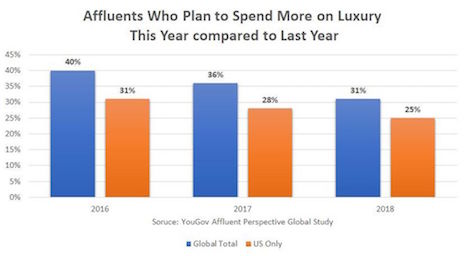
 Affluent consumers who expect to spend more this year versus last. Source: YouGov Affluent Perspective Global Study 2018
Affluent consumers who expect to spend more this year versus last. Source: YouGov Affluent Perspective Global Study 2018
 Affluents who plan to spend more on luxury this year than last. Source: YouGov
Affluents who plan to spend more on luxury this year than last. Source: YouGov State of Luxury 2018 Business conditions luxury industry. Source: State of Luxury 2018 report by Luxury Daily and Unity Marketing
State of Luxury 2018 Business conditions luxury industry. Source: State of Luxury 2018 report by Luxury Daily and Unity Marketing Cara S. David
Cara S. David Pam Danziger is president of Unity Marketing
Pam Danziger is president of Unity Marketing